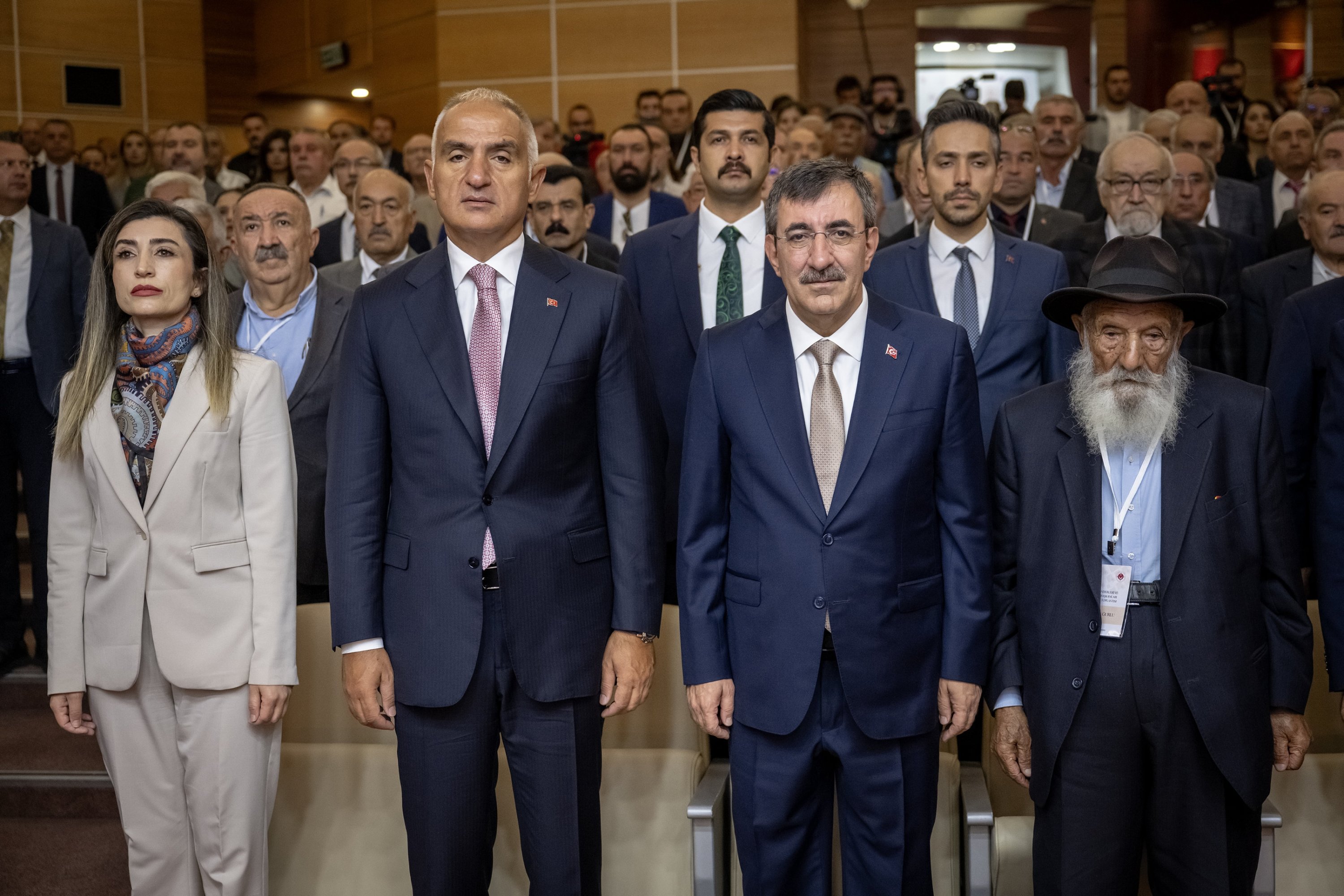Physical Address
Indirizzo: Via Mario Greco 60, Buttigliera Alta, 10090, Torino, Italy
Physical Address
Indirizzo: Via Mario Greco 60, Buttigliera Alta, 10090, Torino, Italy


Turkish officials reiterated their commitment to inclusivity and national unity on Thursday at a high-level consultation meeting with Alevi faith leaders and cemevi presidents in Ankara, underscoring the government’s efforts to strengthen ties with the Alevi-Bektashi community and institutionalize greater support for cemevis nationwide.
Vice President Cevdet Yılmaz and Culture and Tourism Minister Mehmet Nuri Ersoy addressed the meeting held at the Alevi-Bektashi Culture and Cemevi Presidency, a relatively new institution established to coordinate state policy on cemevis and preserve the Alevi-Bektashi heritage.
Both officials emphasized that Türkiye’s rich mosaic of cultures and faith traditions is a source of strength for the nation and a guiding principle for its future.
Yılmaz, speaking to faith leaders from across Anatolia, emphasized the government’s inclusive approach and the importance of recognizing commonalities while respecting differences.
“We have so many things in common: our God is one, our book is one, our prophet is one, our love for the Ahl al-Bayt is one, our homeland is one, our flag is one, our state is one,” he said.
He stressed that differences would never be grounds for exclusion, saying: “No one will marginalize another. No one will force another to be like them, to the point of being like them. We will accept each other as we are, love each other and respect each other.”
Framing the discussion around the values of the Alevi-Bektashi tradition, Yılmaz said its human-centered philosophy, which emphasizes love, respect and compassion, is what the wider world needs most today.
“In the Alevi-Bektashi culture, people are at the center. As long as you keep people at the center, no problem cannot be solved. Today, both our region and the world desperately need this understanding that centers people and love,” he said.
Yılmaz also drew historical and spiritual parallels, comparing the suffering in Karbala, a defining moment for Shiite and Alevi identity, to the humanitarian crisis in Gaza.
“What happened in Karbala is actually happening in Gaza. Innocent people are being condemned to hunger and thirst and massacred. A genocide is being committed,” he said.
“Whoever we sided with in Karbala in the past, we must stand with the same side today,” Yılmaz added.
The vice president expressed confidence that the Alevi-Bektashi community would play an increasingly significant role in strengthening national solidarity. “I wholeheartedly believe that the Alevi-Bektashi community will make significant contributions,” he said.
Meanwhile, Ersoy echoed Yılmaz’s message and pledged stronger institutional support for cemevis.
“As the Ministry of Culture and Tourism, it is of great importance to us that, thanks to the work of our Presidency, the institutional structure of our cemevis be strengthened and the ideas and suggestions of our faith leaders be implemented,” he said.
He highlighted the continuity between the Alevi-Bektashi heritage and the broader cultural legacy of Anatolia, citing spiritual figures such as Mevlana Jalaluddin Rumi, Yunus Emre and Hacı Bektaş Veli as enduring sources of guidance.
“This nation learned from Mevlana, Yunus and Hacı Bektaş Veli to look at life with love, compassion and justice. We want to be able to pass this teaching on to our youth, to the new generations, to our future, in the right and deserving way,” Ersoy said.
“These values are among our most important guides in building our future,” he said, noting that the consultation meeting would help shape not only current policy but also Türkiye’s cultural trajectory for decades to come.
Esma Ersin, president of the Alevi-Bektashi Culture and Cemevi Presidency, also addressed the gathering, calling the meeting “a step forward for the Alevi faith and culture.”
She emphasized that cemevis are not only houses of worship but also centers of cultural transmission, where younger generations learn values of tolerance and solidarity.
“Alevi-Bektashi wisdom, one of Anatolia’s spiritual heritages, will always remain a beacon of light from our past to our present and our future,” Ersin said. “The greatest legacy this wisdom has left us is that it has brought faith to culture, culture to morality and morality to love for humanity. It is our fundamental duty to strengthen this connection and carry it forward for future generations.”
Ersin emphasized the importance of consultation with local leaders, intellectuals, and Cemevi representatives, noting that their contributions are “invaluable in making our services more comprehensive and inclusive.”
The consultation meeting is the latest in a series of steps by the government to engage more deeply with the Alevi community, part of a broader initiative to address long-standing concerns over recognition of cemevis and cultural rights.
Officials said the government sees cemevis not only as religious centers but as vital institutions of civil society, embodying values of coexistence and solidarity that are essential to Türkiye’s national identity.
Both Yılmaz and Ersoy framed the meeting as part of a vision that transcends political divides, insisting that unity must remain above partisan debates. The government’s message, they said, was clear: the Alevi-Bektashi community, with its deep spiritual and cultural heritage, is an inseparable part of the Turkish nation and strengthening its institutions is strengthening Türkiye’s unity.
The Alevi faith is defined as a combination of Shiite Islam, the Bektashi Sufi order and Anatolian folk culture rather than as a separate religion. In Türkiye, Alevis comprise a large community with approximately 20 million followers, although official figures are unavailable.
The community has long raised concerns over the public recognition of their identity, the legal status of cemevis and education issues, including the right for Alevi students to opt out of compulsory religion classes. Currently, cemevis are classified as foundations under the Interior and Culture and Tourism Ministries, rather than as official houses of worship, which limits their access to state funding available to mosques, churches and synagogues of recognized religious minorities.